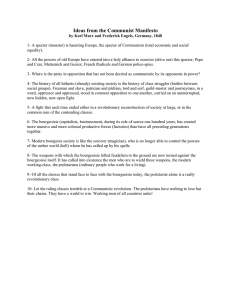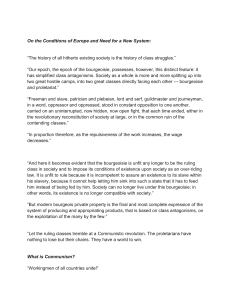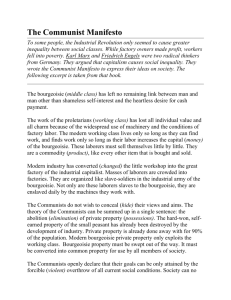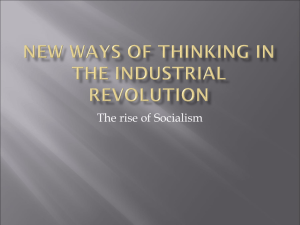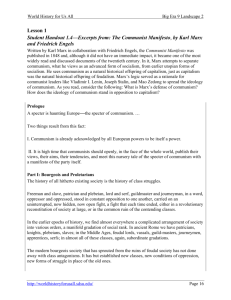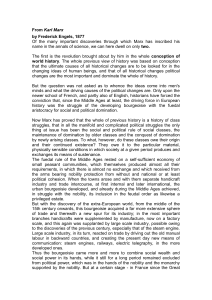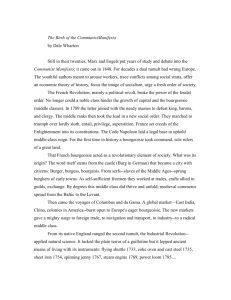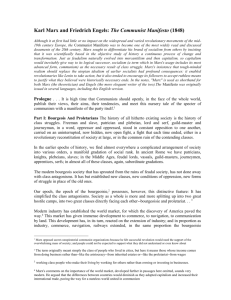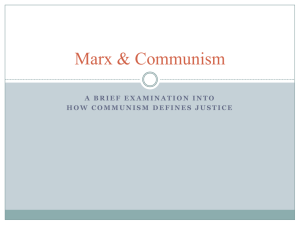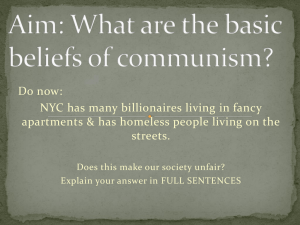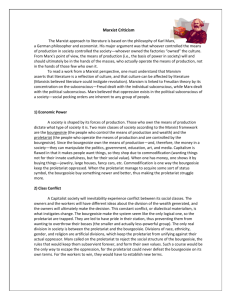The Communist Manifesto
advertisement
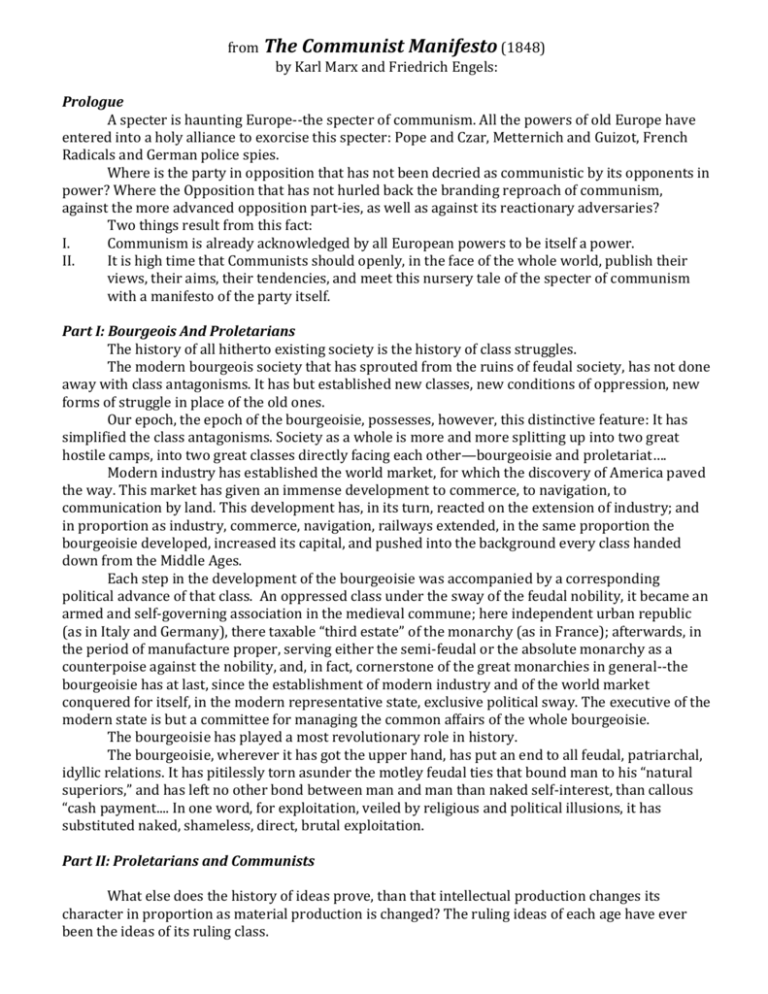
from The Communist Manifesto (1848) by Karl Marx and Friedrich Engels: Prologue A specter is haunting Europe--the specter of communism. All the powers of old Europe have entered into a holy alliance to exorcise this specter: Pope and Czar, Metternich and Guizot, French Radicals and German police spies. Where is the party in opposition that has not been decried as communistic by its opponents in power? Where the Opposition that has not hurled back the branding reproach of communism, against the more advanced opposition part-ies, as well as against its reactionary adversaries? Two things result from this fact: I. Communism is already acknowledged by all European powers to be itself a power. II. It is high time that Communists should openly, in the face of the whole world, publish their views, their aims, their tendencies, and meet this nursery tale of the specter of communism with a manifesto of the party itself. Part I: Bourgeois And Proletarians The history of all hitherto existing society is the history of class struggles. The modern bourgeois society that has sprouted from the ruins of feudal society, has not done away with class antagonisms. It has but established new classes, new conditions of oppression, new forms of struggle in place of the old ones. Our epoch, the epoch of the bourgeoisie, possesses, however, this distinctive feature: It has simplified the class antagonisms. Society as a whole is more and more splitting up into two great hostile camps, into two great classes directly facing each other—bourgeoisie and proletariat…. Modern industry has established the world market, for which the discovery of America paved the way. This market has given an immense development to commerce, to navigation, to communication by land. This development has, in its turn, reacted on the extension of industry; and in proportion as industry, commerce, navigation, railways extended, in the same proportion the bourgeoisie developed, increased its capital, and pushed into the background every class handed down from the Middle Ages. Each step in the development of the bourgeoisie was accompanied by a corresponding political advance of that class. An oppressed class under the sway of the feudal nobility, it became an armed and self-governing association in the medieval commune; here independent urban republic (as in Italy and Germany), there taxable “third estate” of the monarchy (as in France); afterwards, in the period of manufacture proper, serving either the semi-feudal or the absolute monarchy as a counterpoise against the nobility, and, in fact, cornerstone of the great monarchies in general--the bourgeoisie has at last, since the establishment of modern industry and of the world market conquered for itself, in the modern representative state, exclusive political sway. The executive of the modern state is but a committee for managing the common affairs of the whole bourgeoisie. The bourgeoisie has played a most revolutionary role in history. The bourgeoisie, wherever it has got the upper hand, has put an end to all feudal, patriarchal, idyllic relations. It has pitilessly torn asunder the motley feudal ties that bound man to his “natural superiors,” and has left no other bond between man and man than naked self-interest, than callous “cash payment.... In one word, for exploitation, veiled by religious and political illusions, it has substituted naked, shameless, direct, brutal exploitation. Part II: Proletarians and Communists What else does the history of ideas prove, than that intellectual production changes its character in proportion as material production is changed? The ruling ideas of each age have ever been the ideas of its ruling class. When people speak of ideas that revolutionize society, they do but express the fact that within the old society the elements of a new one have been created, and that the dissolution of the old ideas keeps even pace with the dissolution of the old conditions of existence. When the ancient world was in its last throes, the ancient religions were overcome by Christianity. When Christian ideas succumbed in the eighteenth century to rationalist ideas, feudal society fought its death-battle with the then revolutionary bourgeoisie. The ideas of religious liberty and freedom of conscience, merely gave expression to the sway of free competition within the domain of knowledge. “Undoubtedly,” it will be said, “religion, moral, philosophical and juridical ideas have been modified in the course of historical development. But religion morality, philosophy, political science, and law, constantly survived this change.” “There are, besides, eternal truths, such as Freedom, Justice, etc., that are common to all states of society. But communism abolishes eternal truths, it abolishes all religion, and all morality, instead of constituting them on a new basis; it therefore acts in contradiction to all past historical experience.” The Communist revolution is the most radical rupture with traditional property relations; no wonder that its development involves the most radical rupture with traditional ideas.… Part IV: Position of the Communists in Relation to the Various Existing Opposition Parties In short, the Communists everywhere support every revolutionary movement against the existing social and political order of things. In all these movements they bring to the front, as the leading question in each case, the property question, no matter what its degree of development at the time. Finally, they labor everywhere for the union and agreement of the democratic parties of all countries. The Communists disdain to conceal their views and aims. They openly declare that their ends can be attained only by the forcible overthrow of all existing social conditions. Let the ruling classes tremble at a Communist revolution. The proletarians have nothing to lose but their chains. They have a world to win. Workingmen of all countries, unite! Questions for homework and discussion 1. What are the bourgeoisie and the proletariat? (Try to figure this out from context clues, if not, look it up. 2. Clearly describe the roles of both the bourgeoisie and proletariat in history according to Marx. 3. What common patterns do Marx and Engels find in history? Why do they say these patterns occur? What do they will/should be done to fix them? 4. How do Marx and Engels label their upcoming revolution? How do they say it will affect culture, politics, economics, and history? Why are they do certain this will occur? 5. What does the phrase “Workingmen of all countries unite?” Why is it fitting given the rest of the reading?
